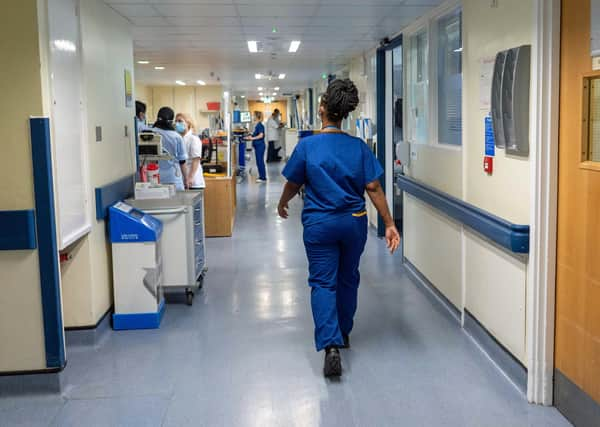NHS Scotland: Tens of thousands of staff take sick leave due to mental health


More than 75,000 NHS staff have taken absence with mental health issues in the last five years, according to new figures - with the number of absences doubling since 2018.
Various freedom of information requests, sent to every health board in Scotland, show that 74,013 NHS workers have missed shifts due to anxiety, stress, depression or other mental health related illnesses since 2018.
Advertisement
Hide AdAdvertisement
Hide AdHowever, this figure is likely to be much larger, as NHS Greater Glasgow and Clyde only revealed absences over the last three years. Despite this, NHSGGC had the highest tally out of Scotland’s 14 health boards, with 16,452 absent staff over that period.
The findings also reveal over 1.5 million working days have been lost due to the absences. Again, the true figure is likely much higher as both NHS Tayside and NHS Forth Valley refused to reveal this information.
Freedom of information requests have also shone a light on the gruelling shifts NHS workers are being asked to undertake. At NHS Borders, one member of staff worked a 19-hour shift in 2022. Although only five health boards provided data, NHS Borders confirmed the longest shift a member of staff had completed in 2022 was 19.5 hours.
Figures show the problem has got worse since 2018. The number of staff that were absent for mental health reasons has doubled since then, when 8,172 staff reported an absence due to anxiety, stress, depression or other mental illness.
This is compared to 17,528 in 2022 up to November. Similarly, 152,608 working days were lost in 2018, compared to 363,930 in 2022 up to November.
Scottish Conservative shadow health secretary Dr Sandesh Gulhane said the figures are “deeply concerning”.
“My dedicated colleagues on the frontline are beyond breaking point and for many this has clearly taken an awful toll on their mental health,” said Dr Gulhane.
“My thoughts are with those NHS workers who have been struggling with these issues.
Advertisement
Hide AdAdvertisement
Hide Ad“These findings fully expose how overwhelmed so many of them have become on the SNP’s watch, due to the shortage of frontline staff which is the product of dire workforce planning by successive health secretaries.
“We should never have reached this point. These figures will be even worse given a lot of health boards – including the country’s largest – didn’t provide all the information requested.
“The new SNP health secretary – Michael Matheson – has to use these figures as an urgent wake-up call. He should start by ripping up Humza Yousaf’s NHS Recovery plan which has totally failed to remobilise our NHS.”
Colin Poolman, director of the Royal College of Nursing (RCN) Scotland, said the findings are “extremely worrying”.
“Nursing staff across NHS Scotland services are telling us that staff shortages are impacting on their ability to provide safe care for patients and on their, and their colleagues, wellbein,” said Mr Poolman.
“It is vital that employers take account of the impact the sustained pressure on services is having on the nursing workforce.
“Nurses and nursing support workers are exhausted and worn down by the past three years.
“The Scottish government and health boards must do all they can to protect the mental and physical wellbeing of the workforce and to prevent nursing staff being spread more thinly.”
Advertisement
Hide AdAdvertisement
Hide AdA spokesperson for NHSGGC said: “NHS Greater Glasgow and Clyde is the largest health board in the UK with more than 40,000 employees and the health and wellbeing of our staff is an absolute priority.
“We have introduced various services to support staff such as our occupational health service, our dedicated mental health and wellbeing resources and our rest and relaxation hubs.
“We would like to thank our staff who worked tirelessly throughout the period of the pandemic that covers the duration of the figures outlined.”
A spokesperson for the Scottish Government said: “We are immensely grateful for the incredible efforts of all of our NHS and Social Care staff as we continue to recover from the pandemic.
“Our health care system continues to be under substantial pressure and we are working with health boards to provide long-term sustainable support.
“The nursing and midwifery taskforce, which met for the first time last week, will also look to explore and develop proposals on a range of initiatives, including staff well-being.”
Comments
Want to join the conversation? Please or to comment on this article.